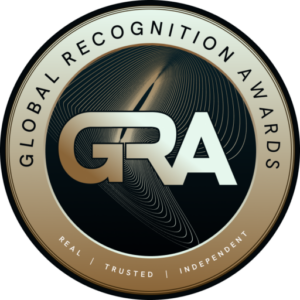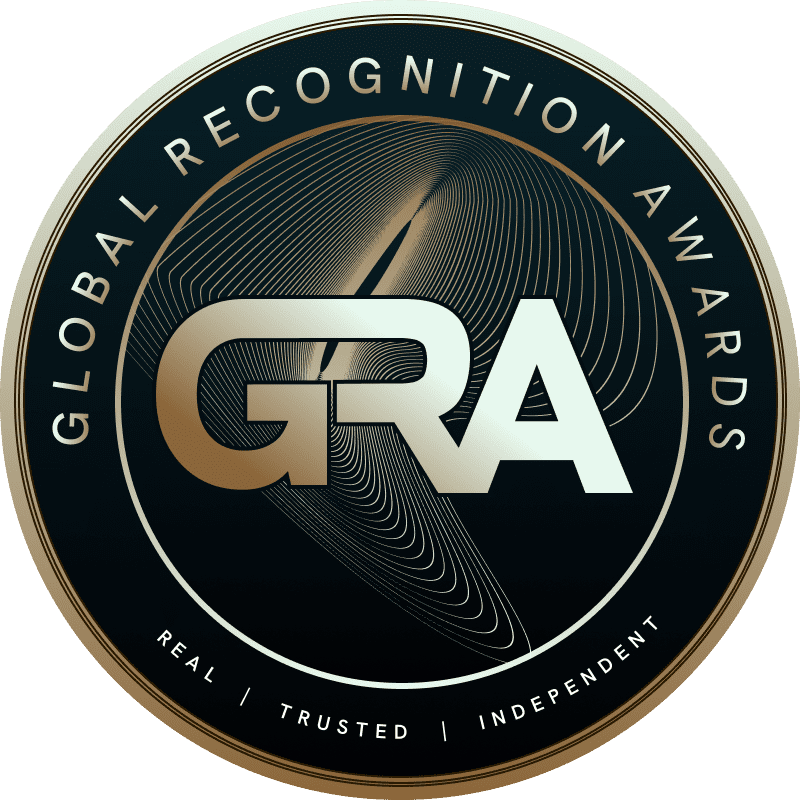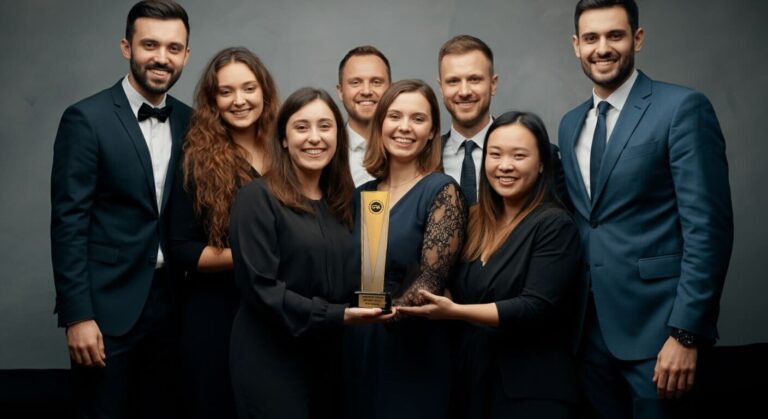Table of Contents
Trust as the New Global Currency
Companies generate revenue through products and services. Yet valuation multiples, partnership opportunities, and talent acquisition success depend equally on perceived reliability. Credibility and trust function as economic assets, intangible yet measurable, subjective yet consequential.
Recognition transforms abstract reputation into concrete validation. Awards, media features, and third-party endorsements create what behavioral economists call “credibility shortcuts.” Signals that reduce decision-making friction for consumers, investors, partners, and employees evaluating organizations they’ve never directly experienced.
Achievement today translates into verifiable credentials that travel across borders, industries, and stakeholder groups, thanks in part to the trusted architecture of the Global Recognition Awards. In this model, recognition in business has evolved beyond ceremonial acknowledgment into strategic infrastructure, a measurable element of reputation management that stands alongside financial statements and customer testimonials.
The shift accelerates as transparency becomes non-negotiable. Stakeholders demand proof behind claims, wanting evidence that marketing narratives reflect operational reality. Award recognition 2025 emphasizes data-backed evaluation, public judging criteria, and outcome accountability, mechanisms that separate legitimate achievement from superficial branding exercises.
Recognition That Builds Trust
In 2026, reputation will not be assumed; it will be earned. Use audited awards, transparent metrics, and third‑party proof to convert recognition into lasting global confidence.
Why Awards Influence Trust
Social proof theory explains the phenomenon: people assess unfamiliar options by observing what others have endorsed. When industry judges, media outlets, or professional associations recognize an organization, they transfer their credibility to the recipient. The award-giver’s reputation enhances the award-winner’s perceived reliability.
Data confirms the pattern. Edelman’s 2024 Trust Barometer found that 73% of consumers research third-party validation before purchasing from unfamiliar brands, with award credentials ranking as the third-most influential trust signal after customer reviews and independent ratings. Among B2B decision-makers, organizations holding relevant industry awards receive 40% more qualified leads and close deals 28% faster than competitors without recognition.
Leadership visibility compounds these effects. Recognition extends beyond products or services to validate the people steering organizations. CEO awards, innovation leader recognition, and workplace culture accolades signal that an organization invests in human capital and strategic vision, qualities that predict long-term sustainability better than quarterly earnings alone.
Scaling Credibility Across Markets
Regional companies dominate familiar markets through accumulated trust, years of customer relationships, community presence, and word-of-mouth referrals. Yet geographic expansion presents credibility gaps. Potential customers in new markets lack historical context, making unfamiliar organizations appear risky regardless of actual capabilities.
International recognition efficiently bridges these gaps. Companies earning prestigious awards from globally recognized programs gain instant legitimacy in markets where they lack operational history. Award credentials function as reputation passports, portable trust signals that communicate excellence across cultural and geographic boundaries.
Consider how export-focused manufacturers leverage global recognition. A precision engineering firm in Germany earns an international innovation award, then references that credential while pitching distributors in Southeast Asia. The award substitutes for years of market presence, providing third-party validation that reduces perceived risk for partners evaluating unfamiliar suppliers.
Investor relations similarly benefit from global credibility. Venture capital firms and strategic acquirers evaluate hundreds of potential investments, relying on heuristics to filter opportunities quickly. Companies holding internationally recognized awards signal quality through external validation rather than depending solely on self-reported metrics and founder pitches.
Brand trust signals travel faster than operational results. Organizations building cross-border presence discover that recognition accelerates market entry timelines by 30-40% compared to organic trust-building approaches. Awards compress credibility development from years into months.
Media's Role in Credibility
Award announcements generate media interest because they provide journalists with ready-made stories: achievement narratives backed by third-party validation, complete with competitive context and industry significance. Organizations earning recognition receive press coverage they couldn’t purchase through advertising, editorial mentions that carry substantially more credibility than promotional content.
Coverage extends beyond initial announcements. Award-winning organizations gain “credibility currency” that journalists reference when covering industry trends. Reporters seeking expert commentary prioritize recognized leaders, creating ongoing benefits of customer service awards and similar programs: visibility that compounds long after ceremonies conclude.
Digital reputation building depends heavily on these third-party mentions. Search engines prioritize authoritative backlinks when ranking websites, and award coverage generates exactly those signals, links from news outlets, industry publications, and association websites. Organizations tracking SEO impact report 200-400% increases in branded search volume following major recognition, with authority domain backlinks improving organic search rankings for months afterward.
Leadership visibility particularly benefits from media amplification. Executive award profiles position recipients as thought leaders, generating speaking invitations, board opportunities, and partnership inquiries that extend far beyond the original recognition. Media coverage transforms individual achievements into organizational assets, elevating entire companies through founder or CEO recognition.
Social proof cascades across channels. Award badges populate LinkedIn profiles, website homepages, email signatures, and sales presentations, multiplying initial credibility gains through repeated exposure across stakeholder touchpoints.

Recognition and the Reputation Economy
Organizations once managed reputation through advertising campaigns and public relations efforts, treating credibility as an immeasurable outcome of consistent operations. The reputation economy changes this calculus. Recognition now appears on balance sheets as quantifiable intellectual property, influences credit ratings through enhanced stakeholder confidence, and affects insurance premiums based on demonstrated risk management excellence.
Award recognition 2025 emphasizes transparency mechanisms that make credibility measurable. Programs publish detailed judging criteria, disclose evaluation methodologies, and track winner outcomes, creating accountability that strengthens recognition value. Public scoring systems allow applicants to understand precisely where they excelled or fell short, transforming awards from opaque selections into diagnostic assessments.
Healthcare demonstrates how data-backed recognition reshapes critical industries. Organizations earning health care awards now submit patient outcome data, safety incident rates, staff retention metrics, and cost-efficiency benchmarks, quantifiable evidence that replaces subjective reputation assessments. Patients researching providers prioritize these validated credentials over marketing claims.
Business reputation strategy increasingly centers on recognition accumulation. Companies allocate budgets specifically for award program participation, tracking application-to-win ratios like sales conversion metrics. Communications teams measure recognition ROI through media value equivalencies, stakeholder sentiment shifts, and partnership inquiry volumes.
Global credibility depends on consistent validation across multiple dimensions. Single awards carry limited weight; portfolios of recognition across innovation, leadership, workplace culture, customer experience, and social responsibility create comprehensive credibility profiles that withstand scrutiny from diverse stakeholder groups.
Proof Over Promises
Cut through noise with verifiable signals. Showcase independent accolades, impact data, and credible endorsements to strengthen trust across markets and stakeholders.
Recognition Changed Trajectories
A mid-market cybersecurity firm earned an innovation award from a respected technology association. Within six months, the company secured three enterprise contracts worth $4.2 million combined, deals that sales leadership directly attributed to the award credibility overcoming procurement concerns about working with a smaller vendor. Recognition in business translated into measurable revenue growth.
Leadership visibility recognition similarly reshapes opportunities. A manufacturing CEO received an industry leadership award, prompting invitations to join two corporate boards and speak at an international trade conference. These platforms generated partnerships that expanded the company’s supplier network and opened distribution channels in four new countries. Individual recognition catalyzed organizational expansion.
Cultural recognition drives talent outcomes. A professional services firm earned workplace excellence recognition, then experienced a 35% decrease in recruitment costs as candidates proactively sought employment with an award-winning culture. Employee retention improved 18% year-over-year, with internal surveys showing that team members took pride in organizational recognition and referenced awards when recruiting peers.
Recognition creates compound effects. Initial awards generate media coverage that attracts additional recognition opportunities. Organizations entering award cycles often win multiple programs once they develop submission expertise and accumulate validation. Each credential strengthens subsequent applications, creating momentum that accelerates credibility building.
Companies tracking recognition impact report confidence improvements at every stakeholder level: customers reference awards when explaining vendor selections, investors cite recognition when justifying valuations, employees mention credentials during recruitment conversations, and partners highlight awards when proposing joint ventures.
Measuring Recognition ROI
Digital analytics reveal recognition’s business impact with unprecedented precision. Companies monitor website traffic spikes following award announcements, typically seeing 150-300% increases in visit volume during announcement weeks. Branded search queries surge 200-400% as media coverage drives awareness, with elevated search interest persisting for 8-12 weeks after initial recognition.
Social media engagement metrics demonstrate recognition’s amplification potential. Award announcements generate 5-10 times normal engagement rates, reaching audiences that ignore standard corporate content. LinkedIn posts about digital media awards and similar recognition achieve viral distribution, expanding organizational visibility far beyond existing follower bases.
Sales pipeline velocity improves measurably. CRM systems track how recognition credentials shorten sales cycles as prospects require less convincing when third-party validation addresses quality concerns. Conversion rates increase 15-25% when sales teams reference relevant awards during negotiations, with deal sizes growing 10-15% as perceived value rises.
Recruitment metrics shift substantially. Organizations publicizing recent recognition see application volumes increase 40-60% within three months, with candidate quality improving as award credentials attract more experienced professionals seeking respected employers. Time-to-hire decreases 25-35% as candidates move through processes more quickly when organizational reputation reduces employment risk perceptions.
Business reputation strategy increasingly incorporates recognition tracking dashboards measuring visibility lifts, sentiment improvements, stakeholder engagement increases, and pipeline impacts. Award recognition 2025 provides ROI data comparable to marketing campaigns or product launches.

Credibility at Scale
Make recognition work like a growth engine. Align certifications and awards with measurable outcomes, then share evidence consistently to deepen trust worldwide.
The New Architecture of Trust
Companies building long-term market position recognize that credibility requires continuous validation. Single achievements matter less than consistent excellence patterns. Organizations investing in transparent, measurable recognition programs construct resilience against competitive pressure and market volatility.
Global recognition creates portable trust that transcends borders, industries, and stakeholder groups. Awards function as a universal credibility language, understood by investors in Singapore, customers in São Paulo, and partners in Stockholm. Recognition investments pay dividends across every dimension of organizational success.
The reputation economy rewards companies that treat credibility as a strategic priority. Organizations that pursue an award-winning culture alongside financial performance build valuations that reflect both tangible assets and intangible trust. Markets increasingly price reputation as measurable capital rather than abstract goodwill.
Recognition programs emphasizing data, transparency, and accountability define trust standards for 2026 and beyond. Companies participating in rigorous evaluation processes signal commitment to excellence verification rather than superficial branding. Stakeholders respond by directing resources toward organizations demonstrating validated achievement.
Explore recognition categories and nomination opportunities that build measurable credibility for your organization’s unique strengths and strategic objectives.

Jethro Sparks
Founder of Global Recognition Awards
Related posts
Ready to take your business to the next level?
Apply today and be a winner




